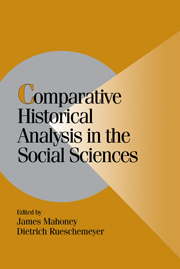Book contents
- Frontmatter
- Contents
- Contributors
- Preface
- Introduction
- I Accumulation of Research
- 2 COMPARATIVE HISTORICAL ANALYSIS AND KNOWLEDGE ACCUMULATION IN THE STUDY OF REVOLUTIONS
- 3 WHAT WE KNOW ABOUT THE DEVELOPMENT OF SOCIAL POLICY
- 4 KNOWLEDGE ACCUMULATION IN COMPARATIVE HISTORICAL RESEARCH
- II Analytic Tools
- III Issues of Method
- Conclusion
- Index
- Cambridge Studies in Comparative Politics
- References
4 - KNOWLEDGE ACCUMULATION IN COMPARATIVE HISTORICAL RESEARCH
THE CASE OF DEMOCRACY AND AUTHORITARIANISM
Published online by Cambridge University Press: 05 June 2014
- Frontmatter
- Contents
- Contributors
- Preface
- Introduction
- I Accumulation of Research
- 2 COMPARATIVE HISTORICAL ANALYSIS AND KNOWLEDGE ACCUMULATION IN THE STUDY OF REVOLUTIONS
- 3 WHAT WE KNOW ABOUT THE DEVELOPMENT OF SOCIAL POLICY
- 4 KNOWLEDGE ACCUMULATION IN COMPARATIVE HISTORICAL RESEARCH
- II Analytic Tools
- III Issues of Method
- Conclusion
- Index
- Cambridge Studies in Comparative Politics
- References
Summary
Surprisingly little attention has been devoted to thinking about knowledge accumulation in the social sciences. Although many social scientists agree that a basic purpose of their research is to produce cumulative knowledge about the world, they do not often reflect on the nature of such accumulation and how it takes place. Currently, we lack a clear answer to questions such as: What constitutes knowledge accumulation in the social sciences? How can it be measured and compared across different scholarly research programs? What promotes or inhibits knowledge accumulation in the social sciences? One might be inclined to see these questions as raising epistemological issues that cannot be resolved across disparate scholarly communities. However, I shall argue in this essay that most social scientists in fact agree on how to answer these questions, at least implicitly and in broad terms. In attempting to outline this shared position, I seek to initiate a larger discussion about how to study knowledge accumulation in social science analysis.
My immediate goal is to assess the extent of knowledge accumulation that has taken place in the field of comparative historical analysis, a research area that is sometimes criticized as having failed to achieve cumulative knowledge. I limit my discussion to studies of the origins of democratic and authoritarian national regimes.
- Type
- Chapter
- Information
- Comparative Historical Analysis in the Social Sciences , pp. 131 - 174Publisher: Cambridge University PressPrint publication year: 2003
References
- 41
- Cited by



